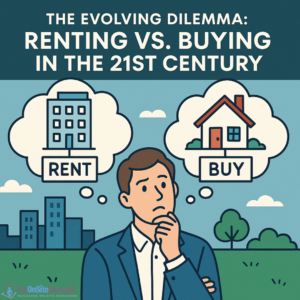For generations, homeownership has been viewed as a key milestone of financial stability and success. However, in today’s economy, the decision to rent or buy a home has become increasingly complex. Factors such as rising home prices, fluctuating mortgage rates, job mobility, and changing lifestyle preferences all play a crucial role in shaping this choice.
A recent Bloomberg article (source) explores how the math behind homeownership has shifted in the 21st century, making renting a more attractive option for many. This blog post expands on those insights, weighing the pros and cons of renting versus buying in today’s economic climate.
Rising Home Prices and Mortgage Rates
One of the biggest barriers to homeownership today is affordability. Home prices have skyrocketed in recent years, making it increasingly difficult for first-time buyers to enter the market. For instance, in cities like New York, the median sale price of a one-bedroom co-op has reached an estimated $770,000—a daunting figure even for high earners.
Additionally, mortgage rates remain elevated, making monthly payments more expensive than in previous decades. Even with a 20% down payment, securing a mortgage on an average-priced home requires a significant financial commitment. Many potential buyers find themselves in a situation where monthly mortgage payments exceed what they would pay in rent for a comparable home.
For example:
- Median asking rent in major U.S. metros: $1,720/month
- Median home listing price: $425,950
- Estimated monthly mortgage payment (with current rates): $2,229/month
These numbers illustrate why renting can be the more affordable option in many areas, especially for individuals who don’t have a large down payment or who anticipate moving in the near future.
Delayed Homeownership and Changing Buyer Demographics
Due to rising costs, homeownership is now happening later in life. According to recent data, the median age of first-time homebuyers has risen to 38, a significant increase compared to past generations.
Why are people waiting longer to buy homes?
- Higher costs of living – Expenses such as student loans, healthcare, and inflation make it difficult to save for a down payment.
- Career flexibility – Younger professionals are prioritizing job mobility over long-term housing commitments.
- Housing market instability – Some prefer to wait until interest rates drop or market conditions become more favorable.
This delay in homeownership reflects a broader societal shift: younger generations are less willing to stretch their finances to buy a home, especially when renting provides more flexibility.
Renting as a Strategic Financial Decision
While homeownership has traditionally been considered the “better investment,” renting is becoming a more financially sound choice for many.
Benefits of Renting:
- Lower upfront costs – No need for a large down payment or closing fees.
- Flexibility – Easier to relocate for job opportunities or lifestyle changes.
- Fewer maintenance expenses – Home repairs and property taxes are the landlord’s responsibility.
- Less risk in volatile markets – No concerns about declining property values.
Downsides of Renting:
- No equity building – Monthly rent payments do not contribute to ownership.
- Rent increases over time – Unlike a fixed mortgage, landlords can raise rent.
- Less stability – Leases may not be renewed, requiring frequent moves.
For those who value financial flexibility, renting can be a smarter short-term strategy, allowing them to invest savings elsewhere, such as in the stock market or retirement accounts.
Couples Prioritizing Homeownership Over Marriage
Another significant trend emerging from the current housing market is that many unmarried couples are choosing to buy homes together before marriage. In 2023 alone, approximately 555,000 unmarried couples purchased homes together, marking a 46% increase from a decade earlier.
What’s driving this shift?
- Financial security over tradition – Many couples see homeownership as a more practical investment than a wedding.
- Rising rental costs – Rather than paying rent, couples are pooling their resources to afford homeownership.
- Changing cultural attitudes – Society is becoming more accepting of alternative life paths.
While this strategy makes sense financially, it also comes with risks—unmarried couples don’t have the same legal protections as married couples when it comes to property division in case of a breakup.
How to Decide: Rent or Buy?
Ultimately, whether to rent or buy depends on a person’s financial situation, career goals, and lifestyle preferences. Here are some key factors to consider:
Buying May Be Right for You If:
- You plan to stay in one location for at least 5-10 years.
- You have stable income and good credit to qualify for a favorable mortgage.
- You can afford a 20% down payment (or a lower down payment with additional costs like PMI).
- You are comfortable taking on maintenance responsibilities and property taxes.
Renting May Be Right for You If:
- You don’t want to be tied down and prefer the flexibility to move.
- You have financial goals beyond homeownership (investing, travel, career changes).
- You live in an area where renting is significantly cheaper than buying.
- You don’t want to deal with the stress of home repairs and maintenance.
Final Thoughts
The age-old question of “rent vs. buy” no longer has a one-size-fits-all answer. The economic realities of the 21st century have shifted the equation, making renting a strategic financial decision rather than just a temporary alternative.
Before making a decision, individuals should carefully evaluate their long-term plans, financial health, and local housing market conditions. While homeownership can still be a smart investment for those who are ready, renting provides valuable benefits for those prioritizing flexibility and affordability.
As market dynamics continue to evolve, the best choice will depend on personal circumstances rather than outdated notions of success.

